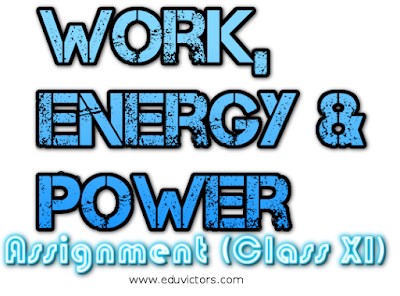WORK ENERGY POWER (Assignment-1)
Q1. A water pump lifts water from a level 10 m below the ground. Water is pumped at a rate of 30
kg/minute with negligible velocity. Calculate the minimum horse power the engine should have to
do this?
Answer: 6.6 × 10⁻² hp
Q2. A man weighs 60 kg. Calculate work done by gravity as he climbs a ladder of heights 5m.
Answer: -2940 J
Q3. A body of mass 0.3 kg is taken up an inclined plane of length 10 m and height 5 m, and then allowed
to slide down to the bottom again. The coefficient of friction between the body and the plane is 0.15
What is the
(a) Work done by the gravitational force over the round trip?
(b) Work done by the applied force on the upward journey?
(c) Work done by the frictional force over the round trip
(d) Kinetic energy of the body at the end of the trip?
Answer: zero, 18.5 J, -7.6J, 10.9J
Q4. A pump can throw up 10 quintals of coal per hour from a coal mine 120 m deep. Calculate the power of the engine in watt assuming that efficiency is 80%.
Answer: 408.3 watt
Q5. A car weighing 1120 kg is going up an incline of 1 in 56 at the rate of 20 m in 2s. Find the power of the engine if frictional force is 64 N.
Answer: 2600 watt
Q6. An automobile moving at a speed of 72 km/h reached the foot of a smooth incline, when the engine is switched off. How much distance does the automobile go up the incline before coming to rest. The angle of inclination with horizontal is 30 0 and g = 9.8 m/s²
Answer: 40.8 m
Q7. A ball of mass m hits a floor with a speed v making an angle of incidence θ with the normal. The coefficient of restitution is e. Find the speed of the reflected ball and the angle of reflection of the
ball.
Q8. A simple pendulum of length 1 m has a wooden bob of mass 1 kg. It is struck by a bullet of mass 10⁻² kg moving with a speed of 2 x 10² ms⁻ⁱ. The bullet gets embedded into the bob. Obtain the
height to which the bob rises before it swings back.
Answer: 0.2 m
Q9. A moving ball of mass m undergoes a head on collision with another stationary ball of mass 2m. Show that the colliding ball loses 8/9 th of its energy after collision.
Q10. A body constrained to move along the z-axis of a co-ordinate system is subject to a constant force F = -i +2j + 3k Newton. What is the work done by this force in moving the body over a distance of 4m along the z-axis?
Answer: 12 J
Q11. A uniform chain of length L and mass M is lying on a smooth table and one third of its length is hanging vertically down over the edge of the table. If g is acceleration due to gravity, calculate work required to pull the hanging part on the table.
Answer: MgL/18
Q12. A pump on the ground floor of a building can pump up water to fill a tank of volume 30 m 3 in 15 minute. If the tank is 40 m above the ground and the efficiency of the pump is 30%, how much
electric power is consumed by the pump?
Answer: 43.567 kW
Q13. A man cycles up a hill whose slope is 1 in 20 with a velocity of 6.4 km/h along the hill. The weight of the man and the cycle is 98 kg. What work per minute is the man doing? What is his horse power?
Answer: 5122.1 J
Q14. The bob of a pendulum is released from a horizontal position. If the length of the pendulum is 1.5 m, what is the speed with which the bob arrived at the lowermost point B, given that it dissipates 5% of its initial energy against air resistance?
Answer: 5.285 m/s
Q15. A body of mass M at rest is struck by a moving body of mass m. Prove that the fraction of the initial energy of mass transferred to the struck body is 4Mm/(M+m)²
Q16. A bullet of mass 0.012 kg and horizontal speed 70 m/s sticks a block of wood of mass 0.4 kg and instantly comes to rest with respect to the block. The block is suspended from the ceiling by thin
wire. Calculate the height to which the block rises . Also, estimate the amount of heat produced in
the block.
Answer: 0.212 m ,6.8 calories
Q17: Water is pumped out of a well 10 m deep by means of a pump rated 10 KW. Find the efficiency of the motor if 4200 kg of water is pumped out every minute. Take g = 10 m/s² .
Answer: 70%
Q18: Two identical 5 kg blocks are moving with same speed of 2 m/s towards each other along a frictionless horizontal surface. The two blocks collide, stick together and come to rest. Consider the two blocks as a system. Calculate work done by
(i) external forces and
(i) Internal forces.
Answer: 0J, -20J

No comments:
Post a Comment
We love to hear your thoughts about this post!
Note: only a member of this blog may post a comment.